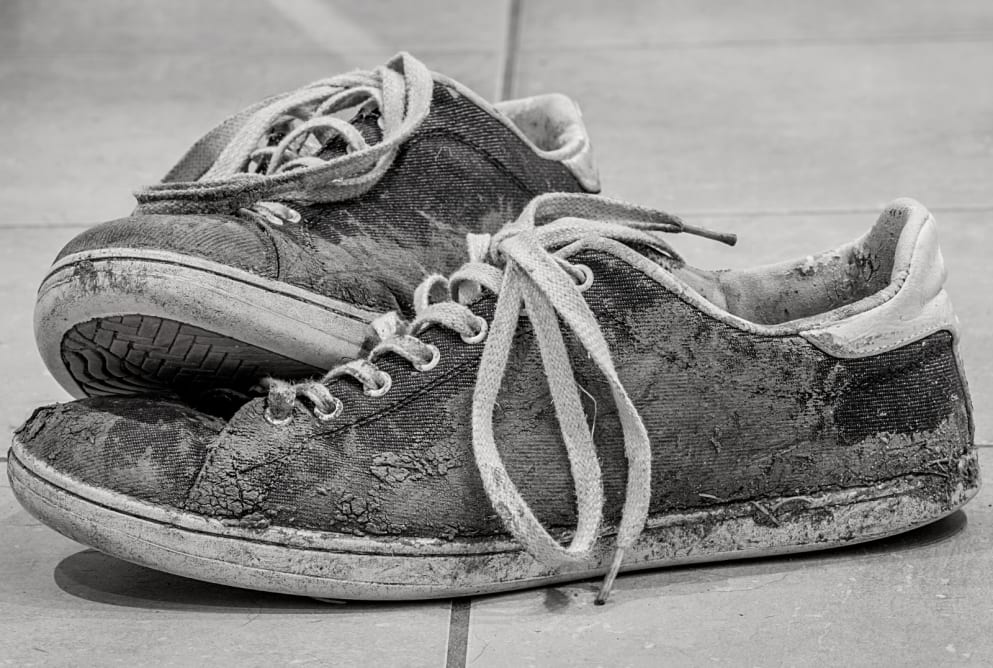Every year, we pick a focus for Simon’s Big Sleep Out, and this year is no exception. This year’s theme is ‘a walk in their shoes’, and it aims to break down and explore just some of the stigmas that are still unfairly and unjustly attached to homelessness and those facing it on a daily basis.
What is stigma?
To give it its dictionary definition, stigma is ‘a mark of disgrace associated with a particular circumstance, quality, or person.’ In the context of the work we do, stigma are certain beliefs and assumptions that may be held against someone who is currently experiencing homelessness.
Such stigmas don’t take into account a person’s individual circumstances, focusing instead on sweeping generalisations. And this is what makes stigma such a huge barrier to progress.
At Simon on the Streets, we work tirelessly to help break down negative stereotypes and assumptions, and ask people to see the person beyond their circumstances. This year’s campaign is asking you to try and put yourselves in the minds of those we work with in order to get a better understanding of homelessness and how we can support people to break the cycle.
Mental health and addiction stigma
When someone experiencing homelessness is also dealing with physical or mental health difficulties or addiction, it can be extremely challenging for them to receive the right support.
Research from the University of Birmingham suggests that the system as it currently stands often leaves people facing homelessness without access to the most basic healthcare.
‘Perceived stigma and discrimination in healthcare settings seems to be even more persistent and shows how much work needs to be done to make primary care more inclusive for homeless people. Our study participants found access to mental health and substance misuse services often challenging as many have dual diagnoses.’
The fact is that when we think of homelessness, we immediately see the central struggles as being related to a lack of food and shelter. In reality of course, this is just the tip of the iceberg, with the psychological struggle of homelessness being just as devastating.
Race and immigration stigma
According to Crisis, those who are most at risk of homelessness are young people, black, Asian and minority ethnic groups, LGBT people, migrants and people with disabilities. And remember, homelessness isn’t limited to sleeping on the streets. It also includes those who have unstable, unaffordable and tenuous living situations. They may have spent a long time in temporary accommodation.
For example, there are still families from the Grenfell Tower disaster that six years on are still living in temporary accommodation. It’s believed by many that racism and discrimination shaped the way the tragedy was dealt with, with institutional prejudice towards low income and immigrant families meaning the government’s promise to make sure every resident was rehoused within three weeks fell to pieces.
This October, Simon on the Streets will be taking part in Light Night Leeds. We’ll be stationed at the David Oluwale Memorial Bridge, a poignant place for our organisation. David was sadly the victim of institutional prejudice, both for his homelessness and his race. He tragically died in the River Aire after fleeing the police. We hope to bring awareness to his, and many others’ stories, and stop stigma and prejudice costing anyone else their lives.
Rising homelessness
Underpinning the campaign as a whole is the stark fact that homelessness can happen to anybody, anywhere and at any time. It could happen to you. As the cost of living crisis continues, more and more households are finding themselves forced into poverty, with uncertainty and fear hanging over their heads when it comes to making ends meet.
With that in mind, harmful stereotypes and assumptions really have no place in any civilised society. Our focus should be on breaking down the barriers, not on making them worse. You can help to make a difference, and we hope to see you at this year’s Big Sleep Out. Help us to end the stigma once and for all.
